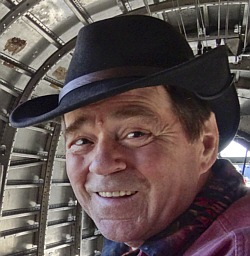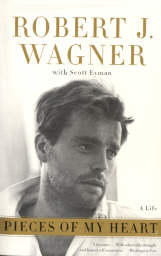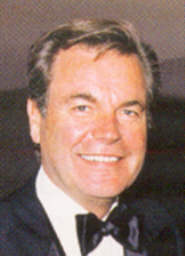Several things had to happen for me to want to read the life of Robert Wagner. First, I had to learn to
like him. Second, I had to be made aware of this book. And, third, someone had to give it to me because
I wouldn't have bought it on my own as I rarely read memoirs, especially of movie stars. When RJ appeared
several times on NCIS, our favorite program, I found him almost playing himself and being very likeable.
He played Tony DiNozzo's father and he delighted in calling Tony, Junior. In one of the DVD commentaries,
Michael Weatherly, who plays DiNozzo, talked about reading RJ's book as homework for RJ's stint on
NCIS and how much he enjoyed reading it. In an unlikely third part of the syzygy, someone gave a copy
of the book to my wife and I watched as she read it, enjoyed it, and when she was finished, she gave it to me.
When I began reading it, I immediately discovered that RJ was a junior himself, taking the nickname RJ to
avoid it, and thus his apparent delight in calling Tony, "Junior".
The authors get this memoir off to a BANG! in the Prologue entitled, "He was Fred Astaire!" The title came from when twelve-year-old RJ slid down a hill of the eleventh hole of the Bel-Air Country Club on a piece of corrugated tin to sit and watch golfers go by. A foursome consisting of Cary Grant, Fred Astaire, Clark Gable, and Randolph Scott walked to putt out across the place where young RJ was sitting in the bushes.
Randolph Scott I knew as a favorite cowboy hero when I was twelve years old —
the other three I
would only meet a decade or so later in the movies — but he was one of our favorite cowboys when we
played cowboys and Indians at that age. We fought to be him. To see those four mega-stars together, at
close range, and to know who they were, was an incredible opportunity for any twelve-year-old boy. And
yet, for RJ, it was just the beginning of his acquaintance with Hollywood stars. If you'd like to have had such
a childhood and growing up in the movie industry, open the pages of this memoir and you can enjoy sharing
the feelings, the excitements, and the thrills along with RJ as he grows up. You'll find yourself smiling,
chuckling, and laughing out loud at some of his stories. Yes, there were times of sorrow, of tears, and of a
deep sense of loss. These are the concomitants of life for anyone who hangs out with people who are older
than they are; you will likely survive them and have to mourn their passing. And RJ had a lot of close friends
who were older than he was. One of these was Clark Gable with whom RJ played a lot of golf later in life.
On a great photo of himself, Gable inscribed, "To R. J., who taught me how to putt a decent golf ball —
thereby saving me unknown $. Clark." (B&W Plate between pages 86 and 87)
Photos such as this one grace many pages of this fine memoir, all from RJ's personal collection. Do you
have a personal favorite movie or role of his? You'll likely hear it mentioned within the cover of this book
along with so many of the illustrious stars he played along with. Want to be a fly-on-the-wall in the men's
room with him when an inebriated Clifton Webb gives his little friend a drink of brandy? Or when RJ
discovers the cosmetic enhancement Jayne Mansfield did to herself which led to a photo of Sophia Loren
looking askance at Jayne's cleavage? Or when RJ caught Errol Flynn in flagrante delicto? It's all here
awaiting your perusal.
Most of all the young RJ wanted to be a movie star. He learned to imitate them, but in the process
learned an important lesson.
RJ wrote about his introduction to jazz and how you can tell from the first few notes who is performing
a given song.
Clearly RJ strove for and found out who he was, finding a tone of his own. He played the young
handsome lover, but never became a Tab Hunter; he played a cowboy but never became a Randolf Scott;
he played an evil doctor but never became a Boris Karloff; he played a nice guy and became and stayed
a likeable Robert Wagner.
He met Barbara Stanwyck on the production of Titanic when he was 22 and she 45 and they were
together for four years, the first woman RJ ever loved, and she was a major factor in his maturation. Finally
she came to him and said that she loved him, but . . .
[page 64] I couldn't argue with her reasoning. There was simply no way we could
have been married at that time. I would have always been Mr. Stanwyck, and we
both knew it.
She was an enormous influence in my life, and still is. I remain immensely
grateful. I gave her things, nice things, such as a four-leaf clover necklace made out
of platinum and diamonds, a piece of jewelry she always set special store by. But
the things I gave her were dwarfed by the things she gave me. If I had to limit it to
just one thing, I would say she gave me self-esteem. To have a woman of her
beauty and accomplishment see value in me and give herself totally to me couldn't
help but have a powerful impact on my psyche. Barbara was the first savior in my
life.
When RJ stuck his neck out with the studio to add Fred Astaire to his show "It Takes a Thief", it
proved to be a successful addition. One day RJ and Fred were in Rome and returning from lunch together
to the villa where they were shooting, and the crew saw them coming.
[page 190] One guy began clapping his hands rhythmically and called out "Fred!"
The rhythm and the call were quickly picked up by the rest of the crew, and as
"Fred! . . . Fred! . . . Fred! . . ." reverberated around the ballroom, Fred began to
dance. He did incredible little combinations and twirls, kicked the piano, and danced
around the ballroom to the clapping of the crew. It was pure dancing, for his own
pleasure and the pleasure of the people he was working with. I just stood there and
thought, Remember this.
There was a fourth reason for my reading this memoir by Robert Wagner, which I have saved until now.
The circumstances of Natalie Wood's death seemed suspiciously like he might have been involved with her
death. Nothing in the book helped to clarify what happened that night on the boat when she disappeared
into the water, but his love for her was so heart felt, when they were married the first time, when he missed
her so much while they were divorced, and when they found each other and married a second time, that
there is no way he could have wanted her to be anything but alive and with him for the rest of his life.
After a party at the Foremans where neither spouse was able to attend, RJ drove Natalie home, he felt
the feelings they still had for each other, but the subject never came up. In front of her house, they sat for
a few minutes.
[page 195, 196] "I guess I shouldn't come in," I finally said.
"I guess you shouldn't," she said. She got out and went in the house. I drove down
the street, then had to stop. I was crying, and I couldn't see the road anymore. I
sent flowers the next day, and Natalie sent me a thank-you note.
They were eventually remarried, on a chartered boat, the Rambling Rose, on the water in Catalina, with
Frank Sinatra present who sang for them "Second Time Around" and things were "more lovely, the second
time around" for RJ and Natalie. When Courtney, their daughter, was born to them, Natalie showed her off
to all their Hollywood friends, saying, "Who needs movies?" They were truly happy to be back together.
It was easy to see how and why RJ loved her, and as for why she loved him, we have his own testimony.
[page 214] You can tell why I loved her. Why did she love me? I think it was
because I made her laugh. Natalie had this great, boisterous guffaw, and I could
always make her roll over with laughter. And she knew that I was there for her. A
friend of ours once asked her how she managed to keep herself together. "Because
I always had RJ behind me," she said. "I always know he's there."
On the stage, actors are always told before a performance, "Break a leg!" Ever wonder why that is
such an old tradition? It's because one cannot break a leg on purpose! When someone tells you to do something which can only be done spontaneously, you will be unable to do that very thing under command. "Smile!" is a great example — and decades of photographing pretend smiles have taught
photographers to say anything else, like "Say Cheese" or "Say Underpants" anything which will create a
spontaneous response will make for a great natural-looking smile. In movies, directors will sometimes drop
the final syllable from "ACTION!" into "ACT!" and create a "be spontaneous" paradox, causing Actors
to act instead of be, a potentially deadly career move.
[page 235] You get up in the morning, and you're thinking about the scene you have
to do, and you keep thinking about it while you're being made up. You tell yourself
to keep the scene in perspective with the whole of the film and not to push it. And
then you go on the set, and sometimes the director will say, "Act!" And that's the
thing you don't want to do.
You do not want to act. You want to be.
The inclusion of the story of how Bill Holden died because of an accident which occurred while he was
drinking seems to be RJ setting the stage for the accident which took Natalie's life later.
[page 259] He had gotten drunk, fallen, and hit his head on a table. Not realizing
how badly he had been cut, he had lain down on the bed and bled to death. He had
been dead for four days before he was found. It was a terrible, ignominious death
for a fine man and underrated actor who had been unable to shake his addiction to
alcohol.
One night they were together with Christopher Walken, Natalie's co-star on Brainstorm, and all three
had been drinking, not a lot, but several glasses of wine on shore and a couple of drinks back on the
Spendour anchored offshore of Avalon. Natalie had gone below and Walken began to lecture RJ on how
Natalie should devote herself to her career the way he was doing. RJ got upset with Walken's "total pursuit
of a career" and told him to leave Natalie alone, slamming a wine bottle at one point. They later moved up
to the top deck and things cooled off, but unbeknownst to anyone Natalie had left the boat. When RJ finally
went below, Natalie was nowhere to be found. RJ called a shore boat and went to search for her, thinking
she must have gone back to the restaurant on Catalina Island. The next morning the missing dingy was found
and two hours later she was found. His beloved wife was dead. Her death was ruled accidental, but the
Tabloids made a lot of money publicizing every other imaginable and unimaginable possible explanation for
her death.
As a writer who writes reviews, I learned not to read other people's reviews of any movie or book that
I planned to review. Hard to be original when someone else's words are reverberating through your head. RJ learned
not to read the reviews others wrote of his work.
[page 308] When I was a kid and just starting out, I read my reviews, but I came
to realize that if you believe the good reviews, you have to believe the bad ones.
Rather than focusing on what other people thought of me, I chose to concentrate
on the work, the job, and my commitment to that work.
RJ said that he learned that "there is no such thing as 'what if . . .' There is only 'what is'." He had lost
Natalie, the woman he loved, twice in one lifetime, her death taking "pieces of his heart" away, and the only
way to steer one's ship of life after a devastating loss is to point it into the what is.
~^~
Any questions about this review, Contact: Bobby Matherne
~~~~~~~~~~~~~~~~~~~~~~~~~~~~~~~~~~~~~~~~~~~~~~~~~~~~~~~~~~

 == == == == == == == == == == == == == == == ==
== == == == == == == == == == == == == == == ==
22+ Million Good Readers have Liked Us
22,454,155
as of November 7, 2019
Mo-to-Date Daily Ave 5,528
Readers
For Monthly DIGESTWORLD Email Reminder:
Subscribe! You'll Like Us, Too!
== == == == == == == == == == == == == == == ==
Click Left Photo for List of All ARJ2 Reviews Click Right Bookcover for Next Review in List
Did you Enjoy this Webpage?
Subscribe to the Good Mountain Press Digest: Click Here!


CLICK ON FLAGS TO OPEN OUR FIRST-AID KIT.
All the tools you need for a simple Speed Trace IN ONE PLACE. Do you feel like you're swimming against a strong current in your life? Are you fearful? Are you seeing red? Very angry? Anxious? Feel down or upset by everyday occurrences? Plagued by chronic discomforts like migraine headaches? Have seasickness on cruises? Have butterflies when you get up to speak? Learn to use this simple 21st Century memory technique. Remove these unwanted physical body states, and even more, without surgery, drugs, or psychotherapy, and best of all: without charge to you.
Simply CLICK AND OPEN the
FIRST-AID KIT.

Counselor? Visit the Counselor's Corner for Suggestions on Incorporating Doyletics in Your Work.

All material on this webpage Copyright 2019 by Bobby Matherne





